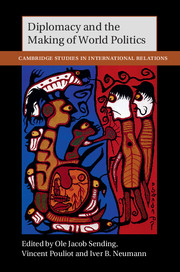Book contents
- Frontmatter
- Contents
- Contributors
- Acknowledgments
- Introduction
- Part I Making of international institutions
- 1 International law and the politics of diplomacy
- 2 Diplomacy, war, and world politics
- 3 The practice of permanent representation to international organizations
- Part II Making international cooperation
- Part III Diplomacy as a contested terrain
- Conclusion: Relationalism or why diplomats find international relations theory strange
- Bibliography
- Index
- Cambridge Studies in International Relations
2 - Diplomacy, war, and world politics
from Part I - Making of international institutions
Published online by Cambridge University Press: 05 September 2015
- Frontmatter
- Contents
- Contributors
- Acknowledgments
- Introduction
- Part I Making of international institutions
- 1 International law and the politics of diplomacy
- 2 Diplomacy, war, and world politics
- 3 The practice of permanent representation to international organizations
- Part II Making international cooperation
- Part III Diplomacy as a contested terrain
- Conclusion: Relationalism or why diplomats find international relations theory strange
- Bibliography
- Index
- Cambridge Studies in International Relations
Summary
What are the relations between diplomacy and war? If diplomats who write about diplomacy are to be believed, diplomacy is both distinct from and opposed to war. It is the “‘art’ of resolving negotiations peacefully.” Similarly, many scholars of diplomacy distinguish diplomacy from war and align diplomacy with peace. For Paul Sharp, diplomacy is about the maintenance of peaceful relations between separate political entities. War marks the “failure of diplomacy.” In Adam Watson's account, it is “the process of dialogue and negotiation by which states in a system conduct their relations and pursue their purposes by means short of war.” Keith Hamilton and Richard Langhorne define diplomacy as “the peaceful conduct of relations amongst political entities.” Realists, and certainly strategists, by contrast, do not necessarily align diplomacy with peace. Diplomacy can be about building alliances and delivering threats. But diplomacy is still seen as distinct from war. Even “coercive diplomacy,” according to Alexander George, is an “alternative to war.”
This chapter argues that it is not, in fact, possible to define diplomacy in opposition to war or to see diplomatic activity as necessarily distinct from the administration and conduct of war. It does so by sketching out a postcolonial and sociological approach to the relations between diplomacy, armed force, and war in world politics. It argues that diplomacy is central to the administration and conduct of war, and to the constitution and use of force more generally. In much international relations (IR) scholarship, understandings of diplomacy and war are premised on Eurocentric accounts of the sovereign states system. This chapter, by contrast, draws on the histories and sociologies of small wars and of other forms of violence used to defeat and rule non-European peoples. It uses them to critique and provincialize Eurocentric accounts, and to inform a general discussion about the relations between diplomacy and war in the making of world politics.
- Type
- Chapter
- Information
- Diplomacy and the Making of World Politics , pp. 55 - 79Publisher: Cambridge University PressPrint publication year: 2015
- 7
- Cited by



